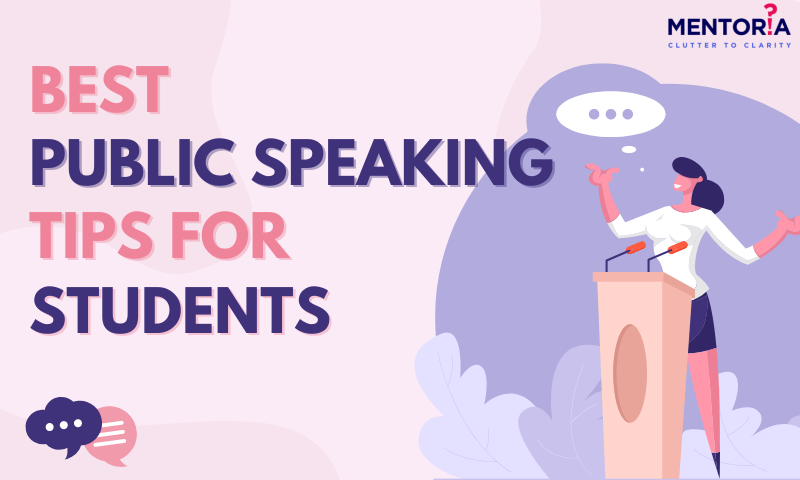Best Public Speaking Tips For Students

Paragliding? Hmm, maybe! Underwater Diving? Wow, sure!? Public Speaking? Ruuuuunn! Well, public speaking is one of the most common fears that can make you really anxious. While getting sweaty palms before a speech is absolutely normal and happens to the best of us, there are ways in which you can improve public speaking. Ultimately, you can gain confidence and eliminate stage fear!
Have you come across videos of Shiv Khera or Shah Rukh Khan on Tedx Talks and been amazed at how they confidently address a large crowd? ell, you can easily become one of them by practicing some simple steps before your speech. You mustn’t let your fear of public speaking get in the way of you communicating your ideas to the world.
Why is public speaking important?
Are you the quiet backbencher who hid their face when a question was asked? Well, it’s easy to avoid uncomfortable interactions when we’re younger. However, as you grow old, you realise the importance of public speaking. From attending interviews to participating in group discussions, not feeling confident enough to present your views can hinder your overall performance. This is where your public speaking skills will come in handy. Public Speaking can have a significant impact on your career path and level of success in your field. For example, it can help sell your idea or product to a stranger, spread awareness, become a motivational speaker, and whatnot!. As a student, this skill helps you make social connections and enhances your leadership qualities.
How To Speak In Public Without Fear?
Stage fright is absolutely normal, however, running away from public speaking because you are scared must never be an option. Take and seize every opportunity, nothing is easy straight away. Here are some tips and tricks that can help reduce anxiety and make you feel confident before your big speech.
1. Do Your Research!
It’s all well and good to believe you have the gift of gab, but what about your subject matter? Make an outline of your speech to help you organise the contents of your speech.
Before you begin crafting your message, consider who it is intended for. You should go for a speech fully knowing who your audience is going to be and how you are going to put your point across to them, in a way that is not offensive or derogatory to anyone. If possible, walk around the venue before giving a speech; don’t let an unexpected venue layout adversely affect your speech.
As communication theorist, Nick Morgan writes in Forbes, one of the best ways to make a speech effective is to write it with the audience in mind.
2. Practice, Practice, And Practice
Even great speakers prepare their speeches ahead of time. Everyone experiences physiological reactions such as pounding hearts and trembling hands. Do not equate these feelings with the fear of failing or making a fool of yourself.
The adrenaline rush that causes you to sweat also makes you more aware and ready to perform at your best. Being well prepared is the best way to overcome this fear. Experiment out loud with a recording device or video camera, then watch yourself to see where you can improve.
Joe Kowan, a musician and graphic designer has a whole bit about how he beat stage fright and that is something you can look up to!
3. Visual Aid is Always a Good Idea
Don’t you like it when things are shown in a visual form? A visual aid, such as a PowerPoint presentation, can help you create your key points while engaging the audience more effectively. Your visual aid should complement rather than distract people. You can use apps like Canva to make your presentations creative and attractive.
4. Make Use Of Non-verbal Communication
The majority of the message is conveyed through nonverbal communication. For many people, public speaking alters their sense of time, causing them to speak faster than they would normally. The top public speakers keep good posture, maintain eye contact with the audience, and move in natural ways.
Even breath control can help, experiment with pushing air into and out of your lungs with your stomach. Take ten slow, deep breaths before beginning your public speaking. Smiling is one way to quickly relax. Keep rereading your outline, you can even watch some TED Talks to get an idea of body language and gestures.
5. Check for Feedback and Adapt
If your personality shines through, you will gain more credibility, and your audience will trust what you have to say if they can see you as a real person.
Even the most dedicated listeners will lose interest or become confused if you deliver a canned speech. Maintain your attention on the audience. Evaluate their reactions, adjust your message, and remain adaptable.
6. Leave a Takeaway and Ask for Feedback
Increase the impact of your speech by leaving the audience with something to think about or a plausible action to take.
Improve your public speaking skills by soliciting feedback from your audience. After all, you want the audience to remember you, don’t you? Time to learn more:
Now Let’s Have A Look At How To Give A Great Speech!
Anyone can give a speech, but to write it in a way that is engaging, informative, and fun at the same time can be quite a task. Here are some ways by which you can make your speech interesting.
1. Grab Their Attention!
Do you like it when a speech begins, “Today I’m going to speak to you about XYZ”? The vast majority do not. Instead, use an eye-opening statistic, an intriguing anecdote, or a succinct quotation. Finish your speech with a conclusion and a powerful statement that your audience will remember.
2. Add Stories, Humour, Metaphors
Stories captivate the attention of other students and convey a message more effectively than facts and figures. Use a story to illustrate a point in your presentation whenever possible.
Metaphors are similar to mini-stories. When you connect something familiar to a new idea or topic, your audience will remember and understand the information better!
3. Ask Rhetorical Questions
A rhetorical question is one that is posed to the audience for dramatic effect or to make a point rather than expecting a response, this will make the audience feel engaged and included. For example, “How could I be so stupid” or “Do you feel like the man in this story?”
Fight Your Fears!
You will have to speak in front of a group at some point in your life. It is normal to be nervous the first time you have to speak in front of your class. It’s not always easy, but with planning, practice, and a realistic perspective on the task, you can confidently approach your next public speaking engagement.
You can even make a career out of public speaking. Not sure how? Kick-start your career discovery journey with Mentoria & be sure to find the right career fit for you. Our 4-step career guidance solution, helps us find the right career fit for you from 3 streams, 850+ courses & 12,000+ careers.






